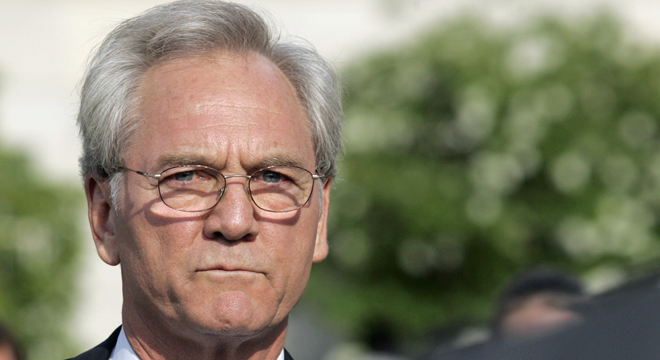Former Alabama Gov. Don Siegelman is pleasant, almost cheerful, as he speaks by phone on the long drive toward the small town of Oakdale, La. It’s not the tone you’d expect to hear from a once-powerful man who’s about to report to prison for the next five years and nine months.
Siegelman, though, is holding out hope. Hope the nation’s highest court will help him. Hope that maybe President Obama will come to his rescue. Hope that somebody, anybody, will get him off the hook.
But for now, on Tuesday morning with about two and a half hours left in his drive, the Democratic ex-governor is phoning up every news organization that will listen to him. His wife and son are by his side. His daughter, he says, is on a computer, corresponding with reporters and scheduling more interviews. He’s telling his story for the umpteenth time.
“I’m still upbeat and positive that, one, the Supreme Court at some point will take up this issue and clear up the law and also hopefully set me free, and if not, we’re hopeful that President Obama after his reelection will grant a pardon or a commutation to my sentence,” Siegelman tells TPM from the road. “We’ll wait until after the election until we make a formal request.”
Seigelman served as Alabama’s lieutenant governor from 1995 to 1999 and governor from 1999 to 2003. But his political career came to an end as federal prosecutors in the Bush administration accused him of taking bribes. They eventually proved their case.
A jury convicted Siegelman in 2006 of doing political favors in exchange for campaign donations. Specifically, jurors found he gave a non-paying job on the state hospital regulatory board to a health care CEO who donated $500,000 towards Siegelman’s campaign for a state lottery fund for universal education.
He already served nine months of his sentence beginning in 2007. But he was allowed to go free the following year while his case was heard on appeal. The appeals court eventually threw out two of his charges, upheld his conviction on the rest and reduced his sentence.
Despite the rulings, Siegelman maintains he is anything but a criminal. He continues to press his oft-stated claims that he is the victim of a selective prosecution by the Bush administration because he was a threat to the establishment in the Republican-dominated state.
He still points to GOP connections to his case that for a time were tantalizing as possible evidence that Siegelman might have been another of the victims of the politicization of the Bush Justice Department — but which haven’t fully convinced the federal courts or the Obama Justice Department. There was a Republican lawyer named Dana Jill Simpson, who claimed a GOP strategist said on a conference call in 2002 that Karl Rove, the president’s deputy chief of staff at the time, talked about having the DOJ investigate Siegelman to get him out of the way. Then there was U.S. Attorney Leura Canary, whose husband was a Republican operative associated with Rove. She was recused from the case, but emails showed she continued to be involved in it.
“The people who have been keeping up with the case I think are certainly aware that there was sworn testimony that put Karl Rove at the center of this prosecution during the time that he was firing U.S. attorneys for not prosecuting Democrats,” Siegelman says from the road. “It was his best friend’s wife who brought this prosecution. There’s no doubt in my mind that this started out as a political dirty trick just to smear my name and hopefully it would lead to my defeat in the 2002 election.”
Meanwhile, almost four years after Bush left office, Rove remains near the very top of American politics. He is a Fox News contributor and he founded American Crossroads, the influential Republican super PAC that is spending enormous amounts of money this year to try to defeat the president. Rove’s continued success and influence grate on Siegelman to the point where tends to dip into outlandish hyperbole.
“I’m disappointed that Rove is still wreaking havoc on the American electoral system this time by raising hundreds of millions of dollars to use against President Obama,” Siegelman says. “The irony is that those people ought to be looking over their shoulders because if I can be sent to prison for six and a half years raising money to try to send kids to college for free, some of those guys could face the execution squad for what they’re doing to the electoral system.”
Siegelman says there are “still a lot of Rove hold-overs” in the Justice Department. “There were a lot of people who were left there who he had vetted and placed in positions. Of course the impact of Rove on our justice system will be felt for decades because he vetted so many judges and U.S. attorneys,” Siegelman says.
“It would be my hope that, after his reelection, that [Obama] would take a hard look at the people he has running the Department of Justice. I’m not talking about Eric Holder of course, but there’s some people in that Department who’ve been there and who’ve been influenced and were working with Karl Rove during the time he was firing the U.S. attorneys and replacing them with people that were more of his liking.”
A few hours after hanging up, Siegelman turned himself into the federal detention center in western Louisiana, where he was given the inmate no. 24775-001. The prison website simply lists his release date as “unknown.”
Correction: Rove served as deputy chief of staff, not chief of staff as originally stated.






